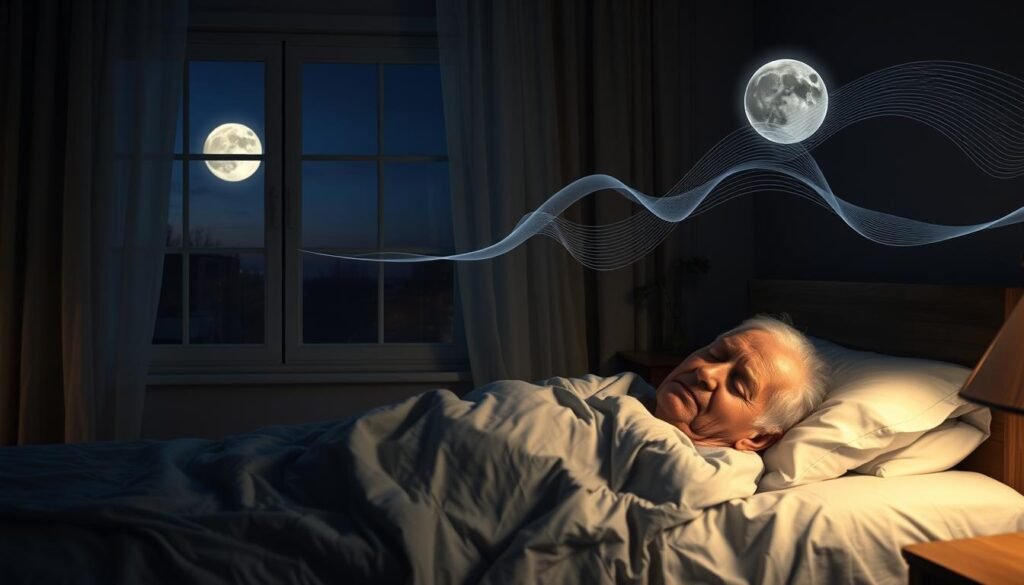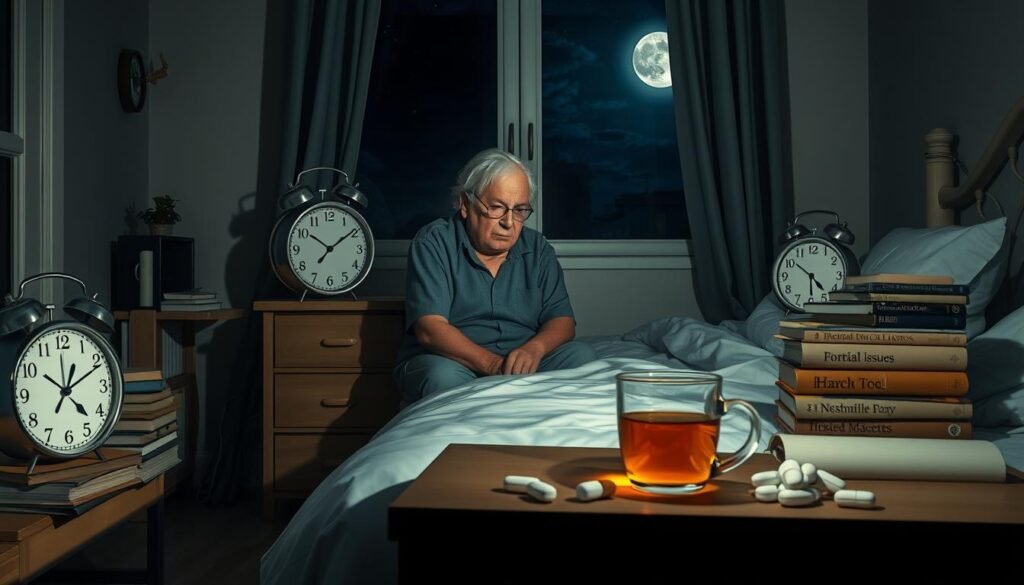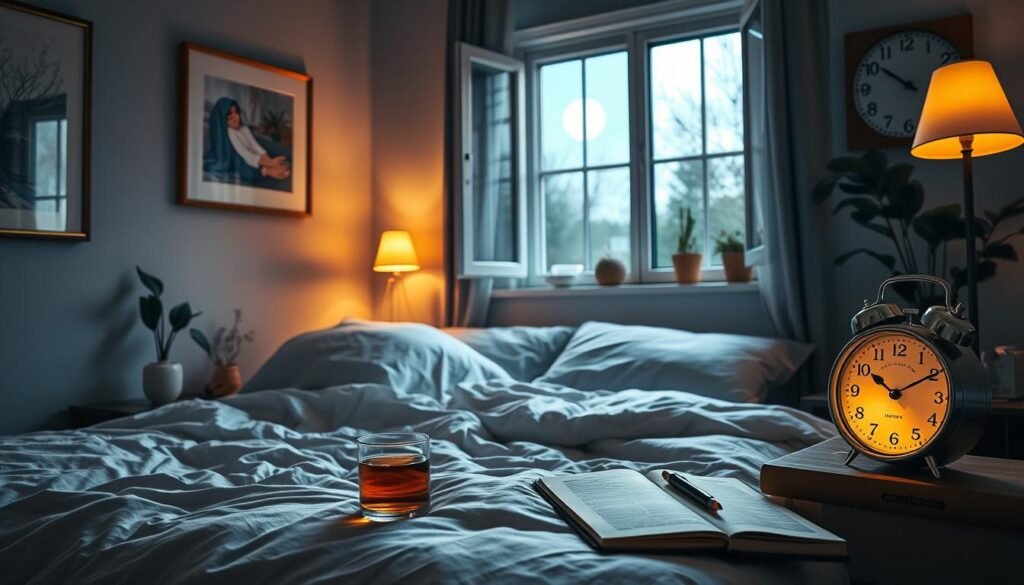Did you know that more than half of older adults struggle with sleep? This is a big issue that not enough people talk about. As people get older, they often find it harder to sleep well. This can lead to other health problems. Insomnia can make it harder to think clearly, impact how you feel, and even lead to serious health issues like heart disease and diabetes. But, there are ways to tackle this and improve sleep for the elderly.
We will explore strategies that have been shown to help seniors with insomnia. These strategies will improve sleep habits and make a big difference in their life quality.
Key Takeaways
- Insomnia affects over 50% of older adults, impacting their mental and physical health.
- Healthy sleep patterns are crucial for preventing chronic health issues in the elderly.
- Effective insomnia in elderly treatment includes lifestyle changes and sleep hygiene improvements.
- Engaging in regular physical activity can significantly improve sleep quality in older adults.
- Understanding the causes of sleep disturbances can help in implementing better sleep solutions for seniors.
- Seeking professional help should be considered when sleep issues persist despite self-management efforts.
Understanding Insomnia in the Elderly
It’s crucial to understand insomnia to help older adults sleep better. Insomnia involves trouble sleeping, staying asleep, or waking up too early. This leads to tiredness and sleepiness during the day. It can make life harder for many seniors. Studies show that up to half of the elderly deal with insomnia, highlighting its importance.
What is Insomnia?
Insomnia means having ongoing problems with sleep, such as:
- Difficulty in initiating sleep
- Waking up frequently during the night
- Waking up too early and being unable to return to sleep
This issue can be short-term or keep coming back, often due to stress or life changes.
Common Symptoms of Insomnia
Insomnia can cause several problems for older adults:
- Irritability
- Fatigue
- Lapses in concentration
- Increased mood disturbances
These issues can significantly disrupt daily life. They show why managing insomnia is critical.
How Insomnia Affects the Elderly
Insomnia can deeply impact older adults, raising their risk for various health problems. It’s linked to more cases of depression, anxiety, heart disease, and high blood pressure. Sleep troubles do more than just leave seniors tired; they can lead to:
- Impaired memory and cognitive function
- Increased risk of accidents due to fatigue
- Lower quality of life and overall satisfaction
Helping the elderly with sleep requires a comprehensive strategy. We must understand the effects of insomnia on mental and physical health.
How Aging Affects Sleep Patterns
Aging significantly influences sleep patterns, introducing changes that disrupt rest quality among older adults. These alterations make falling asleep more difficult and affect sleep’s overall structure. Understanding these changes is crucial for improving elderly sleep outcomes.
Changes in Sleep Architecture
As people age, they see notable changes in their sleep architecture. Research shows they spend less time in deep and REM sleep. This leads to more nighttime awakenings and a fragmented sleep experience. Starting from middle age, the average adult loses about 27 minutes of sleep each decade. This reduction is due to changes in slow-wave NREM and REM sleep percentages, vital for restorative rest.
The Impact of Circadian Rhythms
Circadian rhythms in older adults can become disrupted, altering sleep timing. This often leads to earlier bed and wakeup times, lowering the quality and length of sleep. About 48% of older adults have insomnia symptoms linked to these rhythm changes. These shifts increase the risk of advanced sleep-wake phase disorder, making consistent sleep schedules hard to maintain. Adhering to a strict wakeup time and avoiding daytime naps can help. For more details on managing elderly sleep, see this resource.

| Age Group | Average Sleep Duration Lost (minutes) | Common Sleep Stage Patterns |
|---|---|---|
| 60+ | 27 minutes per decade | Less slow-wave and REM sleep |
| Older Adults | Varies | Higher likelihood of waking during the night |
Causes of Insomnia in the Elderly
It’s important to understand what causes insomnia in the elderly to find good treatments. Many things influence sleep problems in older people. This includes medical, psychological, and lifestyle factors.
Medical and Psychological Factors
Older adults often have medical conditions that affect sleep. Issues like arthritis, asthma, and chronic lung problems can make it hard to sleep well. Mental health problems like depression and anxiety also make insomnia worse.
The presence of these conditions greatly reduces sleep quality and ease. It’s hard for people to fall asleep and stay asleep because of them.
About 30% to 48% of older adults suffer from insomnia symptoms. It’s important to remember that health issues often play a big part in this.
Lifestyle Influences on Sleep
Lifestyle habits play a big role in how well we sleep. Things like sleeping irregularly, not exercising, and bad sleep hygiene can cause sleep problems. People who stay inactive or don’t focus on their sleep often struggle with insomnia.
Things like noise and light in the bedroom also affect sleep. For more details on how lifestyle impacts sleep, check out this resource.
The Role of Medications in Sleep Issues
Many medicines that older adults take can lead to insomnia. Drugs like beta-blockers, antidepressants, and corticosteroids can mess with sleep. Over-the-counter meds can also change sleep patterns. Watching for side effects from meds is key, especially when they’re used together with sedatives.
Since many older adults take various drugs, the interaction between them can harm sleep quality. It’s critical to manage these medication issues to improve sleep.

| Factor | Impact on Sleep |
|---|---|
| Medical Conditions | Chronic pain and respiratory issues hinder sleep quality. |
| Psychological Issues | Depression and anxiety contribute to sleep disturbances. |
| Lifestyle Choices | Sedentary behavior and poor sleep hygiene exacerbate insomnia. |
| Medications | Multiple prescriptions can disrupt sleep patterns. |
Identifying Insomnia in Elderly Treatment
It is important to spot insomnia in older adults to treat it right and improve their living. Many seniors struggle with sleep issues that deeply affect their daily life. It’s key to know when to get help for insomnia, especially in the elderly. Early detection leads to better treatment and sleep.
When to Seek Professional Help
If an older adult has ongoing insomnia, it’s time to seek professional help for insomnia.
Signs that help is needed include:
- Problems starting or staying asleep.
- Feeling tired or grumpy during the day because you didn’t sleep.
- Insomnia lasting more than a few weeks.
- It’s affecting work or hanging out with friends.
About 30% to 48% of older adults feel insomnia symptoms. Catching this early brings relief and better sleep.
Sleep Diaries as a Diagnostic Tool
Using sleep diaries helps manage insomnia in seniors. These journals track their sleep, showing patterns to doctors. Details like bedtime, wake time, and nighttime awakenings are noted.
- When you go to bed and wake up.
- How often you wake up at night and for how long.
- How long you nap during the day.
- What you do before bed.
This information helps doctors craft a personal treatment plan. It identifies sleep patterns and triggers. For tips on diagnosing and treating insomnia, check these expert guidelines.

Proven Strategies for Better Sleep
Managing sleep issues involves several steps. First, it’s key for seniors facing insomnia to practice good sleep hygiene. They should set up a soothing bedtime routine. This helps ease the journey to sleep.
Making the sleep space better is also critical. This involves having a welcoming, sleep-friendly bedroom. It should feel comfortable and help with rest. Keeping a regular sleep timeline can improve sleep quality and their body clock.
Implementing Good Sleep Hygiene
Sleep hygiene means healthy habits for better sleep. It’s important to limit bright screens at night. The blue light from screens can mess with sleep rhythms.
Creating a calm routine before bed helps too, like reading or stretching. Also, avoiding big meals, caffeine, and alcohol before bed helps avoid sleep problems.
Enhancing Sleep Environment
Creating the right sleep setting is key for good rest. Seniors’ bedrooms should be dark, quiet, and cool. Blackout curtains and white noise machines can block out bothersome noises and lights.
A good mattress and pillows add to sleep quality. They are part of maintaining sleep hygiene for restful nights.
Maintaining a Consistent Sleep Schedule
It’s vital for seniors to have a steady sleep schedule. Going to bed and waking up at the same time every day aids sleep. This steadiness helps the body clock and makes falling asleep easier.
Staying active during the day can also help them sleep better at night.
Natural Remedies for Older Adults with Insomnia
Over 60 million Americans have trouble sleeping. Many look for natural sleep aids for older adults. It’s key to know how herbal supplements and diet choices can help with sleep.
Herbal Supplements and Their Effectiveness
Herbal supplements are a gentler option compared to traditional sleep drugs for many seniors. Melatonin, valerian root, and chamomile are favored for their soothing properties. They can help one sleep better. Studies show these herbs can improve sleep without the downsides of prescription drugs. It’s vital for seniors to talk to doctors before trying new supplements. This ensures their health and safety. For more details on helpful supplements, click here.
The Importance of a Balanced Diet
Eating right plays a big role in better sleep. Having lighter meals and cutting back on heavy foods or caffeine at night helps. Foods rich in magnesium, like leafy greens and nuts, and tryptophan, found in turkey and dairy, boost relaxation. Along with keeping a regular bedtime, eating well fights insomnia and lifts health. By eating wisely and keeping a calm night routine, seniors can sleep better.
Managing Insomnia in the Elderly
Insomnia is a big problem for many older adults, with 40-70% affected by it. To tackle insomnia, we combine several methods. This includes cognitive behavioral therapy (CBT-I) and exercise. These methods improve sleep habits and reduce the need for medicines, which can be risky for the elderly.
Cognitive Behavioral Therapy for Insomnia (CBT-I)
Cognitive behavioral therapy for insomnia (CBT-I) is an effective way to treat sleep problems without medication. It works by changing negative thoughts and behaviors about sleep. With strategies like sleep restriction and stimulus control, CBT-I helps improve sleep routines. It leads to better sleep quality and less dependency on sleep meds. It is highly recommended by health experts. For more information on treating insomnia, check out these insights.
The Benefits of Regular Exercise
Adding exercise to daily life helps seniors with sleep issues. It boosts physical health and sleep quality. Moderate exercises can reduce insomnia symptoms and make sleep deeper. Balancing exercise and sleep is key to a healthier life. Activities like walking, stretching, or yoga can improve sleep for seniors safely and effectively.
Behavioral Techniques for Sleep Improvement
Behavioral techniques offer a way to get better sleep. Practices like relaxation exercises and keeping a stable sleep schedule help. Also, cutting down daytime naps and starting a soothing bedtime routine is good. When combined with CBT-I, these methods provide a comprehensive sleep improvement plan. These practical strategies help seniors manage their sleep better.
Sleep Aids and Their Risks for Elders
Many elders find getting good sleep hard. They often turn to sleep aids for help. These can offer short-term relief, but they also carry risks. It’s important to know about these medications before using them to improve sleep quality.
Over-the-Counter Sleep Aids
Seniors might use over-the-counter sleep aids like diphenhydramine and doxylamine. These can make falling asleep easier. However, they’re not without their problems. Using them too much can lead to dependence, daytime sleepiness, and less sharp thinking. For older adults, these side effects might worsen their sleep rather than fix it.
Prescription Medications and Concerns
Doctors often prescribe benzodiazepines and Z-drugs, like zolpidem, for bad insomnia. But, these drugs have big risks, especially for the elderly. They can cause confusion, forgetfulness, and more falls. Many older people have been on these drugs for too long. This shows the need for doctors to think carefully about prescribing them for long periods.
Balancing Benefits and Risks
Choosing the right sleep treatment is crucial. Sleep aids might seem helpful at first, but there are better long-term solutions. Non-medication options, like relaxation exercises and better sleep routines, are safer choices. These can be more helpful over time than sleeping pills, which have many potential side effects and risks of addiction.
| Type of Sleep Aid | Benefits | Risks |
|---|---|---|
| Over-the-Counter | Readily available; may promote sleep | Dependency; memory issues |
| Benzodiazepines | Effective for short-term insomnia | Cognitive impairment; increased fall risk |
| Z-Drugs | Less sedation than benzodiazepines | Memory loss; withdrawal symptoms |
| Natural Remedies | Perceived as safer | Less known side effects |
Conclusion
Improving sleep for the elderly is key to their health and happiness. Treating insomnia often involves multiple strategies. This includes better sleep habits, natural treatments, and therapies that focus on behavior.
A consistent routine, a peaceful sleeping area, and healthy eating can all help with better sleep. Cognitive behavioral therapy is also effective for older people. But, we should use medications with care because long-term effects aren’t well-known. New options like melatonin agonists look promising, yet more research is needed.
As more people live longer, solving insomnia is becoming crucial. By educating about sleep, providing tailored treatments, and ongoing studies, we can support our seniors. This helps them enjoy better sleep and happier days.